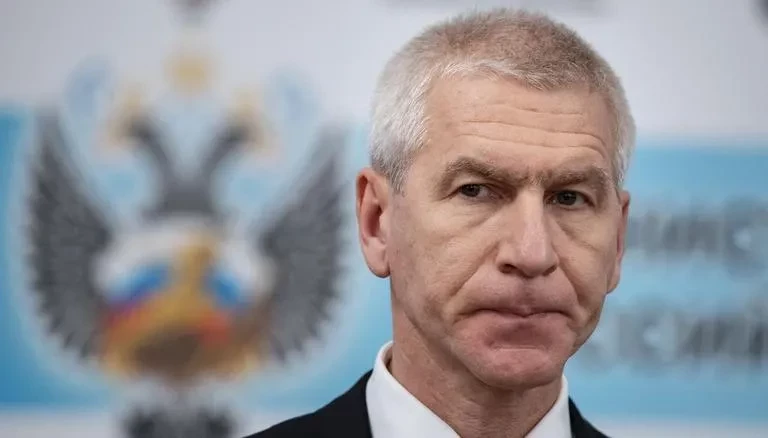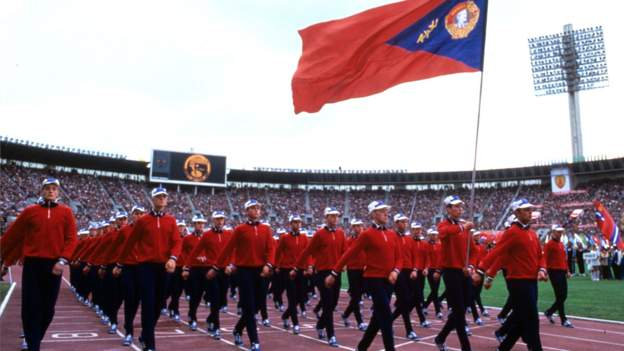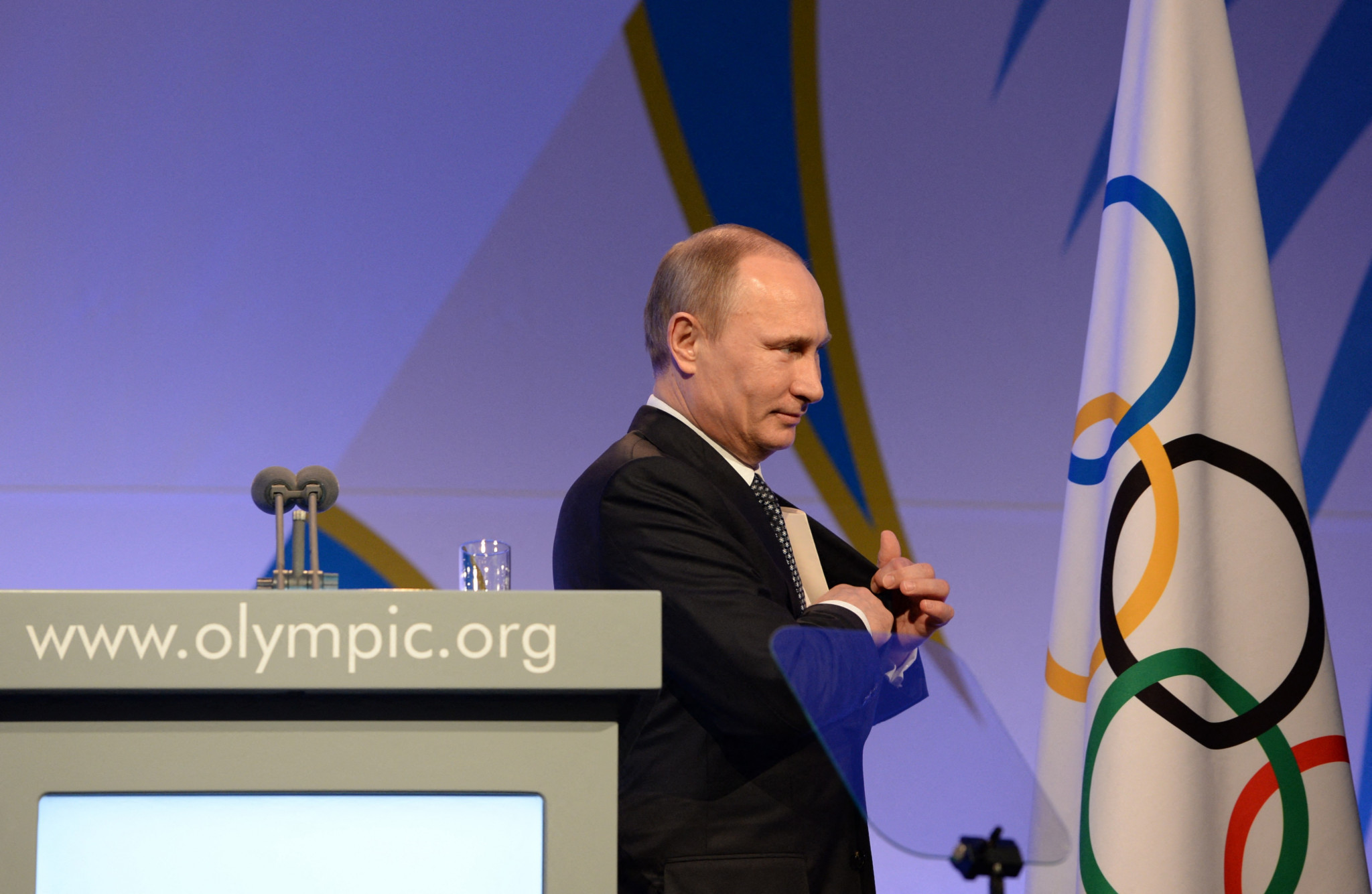La historia se repite cuando Rusia revela planes para lanzar los Juegos Mundiales de la Amistad en 2024
Por Patrick Burke Miércoles 3 de mayo de 2023
El ministro de Deportes de Rusia, Oleg Matytsin, quiere organizar competiciones "en un formato abierto con la invitación de los países socios" ©Ministerio de Deportes de Rusia
El ministro de Deportes de Rusia, Oleg Matytsin, informó al presidente del país, Vladimir Putin, sobre los planes para lanzar su propia serie de eventos internacionales, incluidos los "Juegos Mundiales de la Amistad" el próximo año, poco después de la conclusión de los Juegos Olímpicos en París.
Organizar sus propios eventos fue un tema habitual de discusión cuando Rusia quedó fuera del deporte internacional, con un evento de reemplazo de los Juegos Paralímpicos de Invierno de Beijing 2022 en Khanty-Mansiysk al que asistieron cinco países y los planes continúan para los Juegos de la Organización de Cooperación de Shanghái (OCS), potencialmente con una edición inaugural en Kazan.
El deporte internacional se discutió en una reunión del gobierno organizada por Putin, donde Matytsin describió las esperanzas de lo que calificó como Juegos Mundiales de la Amistad.
"Proponemos intensificar la práctica de realizar competencias en un formato abierto con la invitación de los países socios", dijo Matytsin, según el sitio web oficial del Kremlin.
"Seguimos cumpliendo sus instrucciones [de Putin] de organizar los Juegos Mundiales de la Amistad en el otoño de 2024.
"Consideramos que es necesario utilizar al máximo los recursos de las organizaciones públicas y estatales rusas e internacionales para la celebración exitosa de los Juegos, que deberían celebrarse de forma regular en el futuro".
Entre los vinculados con la organización del evento se encuentra Alexey Sorokin, ex director ejecutivo del Comité Organizador Local de la Copa Mundial de la FIFA 2018, que se realizará en Rusia.
Un evento multideportivo conocido como los Juegos de la Amistad fue organizado en la Unión Soviética y ocho de sus aliados en 1984 en lo que fue ampliamente visto como una alternativa a los Juegos Olímpicos de Los Ángeles 1984 debido a un boicot liderado por Moscú.
Esto siguió a un boicot liderado por Estados Unidos a Moscú en 1980.
En 1986, el magnate de la televisión estadounidense y fundador de CNN, Ted Turner, lanzó los Juegos de Buena Voluntad, que fueron vistos brevemente como un serio rival de los Juegos Olímpicos.
La primera edición se realizó en Moscú y posteriormente se realizó en Seattle en 1990, San Petersburgo en 1994, Nueva York en 1998 y Brisbane en 2001, antes de ser cancelada debido a los bajos índices de audiencia televisivos.
Para tratar de evitar más boicots, la Carta Olímpica se modificó en 1999 para obligar a todos los Comités Olímpicos Nacionales a enviar un equipo a los Juegos Olímpicos de Verano.
El gobierno de Ucrania ha criticado duramente las recomendaciones actualizadas del COI sobre Rusia y Bielorrusia, y amenazó con boicotear las eliminatorias de París 2024 donde participan sus atletas y retirar el estatus de las Federaciones Nacionales que compiten contra ellos.
El COI ha afirmado que "no depende de los gobiernos decidir qué atletas pueden participar en qué competiciones internacionales" y criticó las críticas a su postura como "deplorable", pero sigue existiendo una oposición significativa a la inclusión de Rusia y Bielorrusia en el deporte, particularmente en Europa.
Los críticos rusos han argumentado que las condiciones establecidas son "discriminatorias", pero el COI insiste en que ha "encontrado un término medio".
El COI también ha subrayado que aún no se ha tomado una decisión final sobre París 2024, pero las federaciones internacionales se han dividido en su respuesta a las recomendaciones actualizadas.
Desde el anuncio del COI, el tiro con arco, el piragüismo, el ciclismo, la esgrima, el judo, el pentatlón moderno, el tiro, el monopatín, el tenis de mesa, el taekwondo, el triatlón y la lucha han levantado las prohibiciones generales, pero el atletismo, el bádminton, el baloncesto, la equitación, la escalada deportiva y el surf se han mantenido. sus medidas.
Putin abordó la situación en la reunión del Gobierno y afirmó que algunos funcionarios deportivos estaban dañando el Movimiento Olímpico.
"Nuestros atletas participan en competiciones deportivas internacionales y planean participar en varias competiciones internacionales", dijo en la reunión el líder ruso, despojado el año pasado por el COI de la Orden Olímpica que le había sido otorgada en 2001.
"Ahora no hablaré sobre qué y cómo hacen los funcionarios deportivos internacionales al respecto, quienes a menudo, lamentablemente, descuidan los principios del Olimpismo.
"Bueno, Dios los bendiga, solo dañan este Movimiento Olímpico internacional".
Matytsin también discutió las ambiciones de los Juegos BRICS inaugurales que se realizarán en Rusia en 2024 con socios Brasil, India, China y Corea del Sur, y reveló que 250 atletas rusos competirán en los Juegos Juveniles Ruso-Chinos en Chongqing del 21 al 27 de mayo. .
"La situación actual confirma la importancia y la necesidad de fortalecer aún más la agenda deportiva en el marco de las asociaciones interestatales, como la CEI [Comunidad de Estados Independientes], la OCS y los BRICS, que no están sujetas a sanciones y restricciones de las estructuras deportivas internacionales, " él dijo.
__________________________________
History repeats itself as Russia reveals plans to launch World Friendship Games in 2024
- Wednesday, 3 May 2023

Russian Sports Minister Oleg Matytsin has briefed the country's President Vladimir Putin about plans to launch its own series of international events, including a "World Friendship Games" next year shortly after the conclusion of the Olympic Games in Paris.
Hosting its own events was a regular topic of discussion when Russia was frozen out of international sport, with a Beijing 2022 Winter Paralympics replacement event in Khanty-Mansiysk attended by five countries and plans continuing for a Shanghai Cooperation Organization (SCO) Games, potentially with an inaugural edition in Kazan.
International sport was discussed at a Government meeting staged by Putin, where Matytsin outlined hopes for what he branded as a World Friendship Games.
"We propose to intensify the practice of holding competitions in an open format with the invitation of partner countries," Matytsin said, according to The Kremlin's official website.
"We continue to fulfil your [Putin's] instruction to organise the World Friendship Games in the fall of 2024.
"We consider it necessary to use the resources of both Russian and international public and state organisations to the maximum for the successful holding of the Games, which should be held on a regular basis in the future."
Among those linked with organising the event are Alexey Sorokin, the former chief executive of the Local Organising Committee for the 2018 FIFA World Cup, staged in Russia.
A multi-sport event known as the Friendship Games was organised in the Soviet Union and eight of its allies in 1984 in what was widely viewed as an alternative to the Los Angeles 1984 Olympics because of a Moscow-led boycott.
This followed on from an American-led boycott of Moscow 1980.

In 1986, American television mogul and CNN founder Ted Turner launched the Goodwill Games, which were briefly seen as being a serious rival to the Olympic Games.
The first edition was staged in Moscow and were subsequently staged in Seattle in 1990, Saint Petersburg in 1994, New York City in 1998 and Brisbane in 2001, before being cancelled because of poor television ratings.
To try to avoid further boycotts, the Olympic Charter was changed in 1999 to oblige all National Olympic Committees to send a team to the Summer Olympics.
Ukraine's Government has heavily criticised the IOC's updated recommendations on Russia and Belarus, and threatened to boycott Paris 2024 qualifiers where their athletes participate and withdraw the status of National Federations who compete against them.
The IOC has claimed "it is not up to Governments to decide which athletes can participate in which international competitions" and blasted criticism of its stance as "deplorable", but significant opposition to Russian and Belarusian inclusion in sport remains particularly in Europe.
Russian critics have argued that the conditions laid out are "discriminatory", but the IOC insists it has "found some middle ground".
The IOC has also stressed a final decision on Paris 2024 has not yet been taken, but International Federations have been divided in their response to the updated recommendations.
Since the IOC announcement, archery, canoeing, cycling, fencing, judo, modern pentathlon, shooting, skateboarding, table tennis, taekwondo, triathlon and wrestling have lifted blanket bans, but athletics, badminton, basketball, equestrian, sport climbing and surfing have maintained their measures.

Putin addressed the situation at the Government meeting, claiming some sports officials were damaging the Olympic Movement.
"Our athletes take part in international sports competitions and plan to take part in various international competitions," the Russian leader, last year stripped by the IOC of the Olympic Order he had been awarded in 2001, told the meeting.
"Now I will not talk about what and how international sports officials do about this, who often, unfortunately, neglect the principles of Olympism.
"Well, God bless them they only harm this international Olympic Movement."
Matytsin also discussed ambitions for an inaugural BRICS Games to be held in Russia in 2024 with partners Brazil, India, China and South Korea, and revealed 250 Russian athletes are set to compete in the Russian-Chinese Youth Games in Chongqing from May 21 to 27.
"The situation today confirms the importance and necessity of further strengthening the sports agenda within the framework of interstate associations, such as the CIS [Commonwealth of Independent States], SCO and BRICS, which are not subject to sanctions and restrictions from international sports structures," he said.
